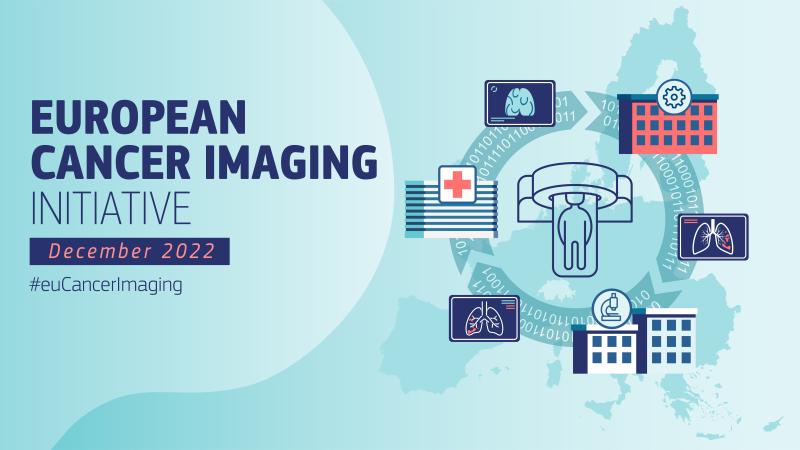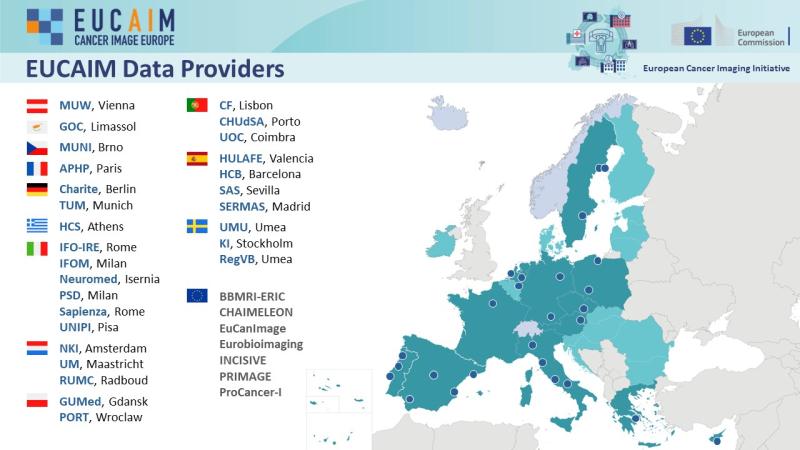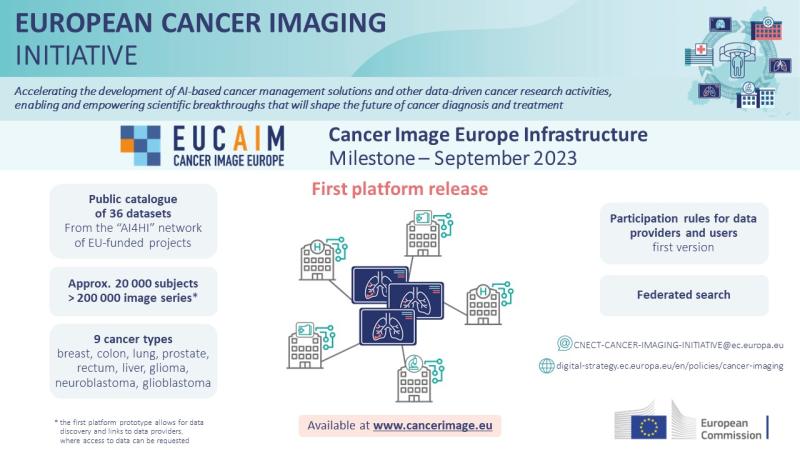
@EuropeanCommission
The European Cancer Imaging Initiative is one of the flagships of the Europe's Beating Cancer Plan (EBCP). One of the objectives of the Plan is to make the most of the potential of data and digital technologies such as Artificial Intelligence (AI) or High-Performance Computing (HPC) to combat cancer.
European Commission
European Cancer Imaging Initiative
The aim of the European Cancer Imaging Initiative is to foster innovation and deployment of digital technologies in cancer treatment and care, to achieve more precise and faster clinical decision-making, diagnostics, treatments and predictive medicine for cancer patients.
The Initiative will showcase how medical images can be accessed, used and pooled, while ensuring a high level of ethics, trust, security and personal data protection in full compliance with EU values and rules. It will make large amounts of cancer images and linked clinical data easily accessible to European clinicians, researchers and innovators in line with the European data strategy and supporting the goals of the European Health Data Space.
What is the European Cancer Imaging Initiative trying to achieve?
Cancer imaging datasets exist for different cancer types, but they are scattered among many repositories and clinical centres in Europe, and they are not easily accessible to clinicians, researchers and innovators.
The European Cancer Imaging Initiative will work towards linking up resources and databases to an open, available and user-friendly infrastructure of cancer images for all stakeholders. This will be achieved through an integrated approach designed with major European research organisations, institutions, and companies. The infrastructure will support the development and benchmarking, testing and piloting of tools for personalised medicine, essentially offering a backbone for next generation of cancer diagnostics and treatments.
How are we going to do this?
The cornerstone of the initiative will be a federated European infrastructure for cancer images data, developed by the EUropean Federation for CAncer IMages (EUCAIM) project funded under the DIGITAL programme (18 MIO EU co-funding). The project starts with 21 clinical sites from 12 countries and aims to have at least 30 distributed data providers from 15 countries by the end of the project.

The project will provide a central hub that will link EU-level and national initiatives, hospital networks as well as research repositories with cancer images data. Clinicians, researchers and innovators will have cross-border access to an interoperable, privacy-preserving and secure infrastructure for federated, distributed analysis of cancer imaging data.
Both common and rare cancers will be included with anonymized images and annotations through this pan-European Cancer Images infrastructure and more than 100,000 cases are expected to be available. At least 50 Artificial Intelligence algorithms, Artificial Intelligence tools and clinical prediction models for researchers within the infrastructure are planned to be deployed by the end of the project.
EUCAIM builds upon the results of the work of the “AI for Health Imaging” (AI4HI) Network which consists of 86 affiliated institutions from 20 countries involved in 5 large EU-funded projects on big data and Artificial Intelligence in cancer imaging: Chaimeleon, EuCanImage, ProCancer-I, Incisive and Primage. These projects are developing Artificial Intelligence algorithms to detect the cancer from imaging and are establishing federated repositories for cancer images.
EUCAIM plans to make cancer images data available to the AI Testing and Experimentation Facility for Health established under the DIGITAL programme. The TEF-Health project started in January 2023. This will allow small and medium-sized enterprises who have developed Artificial Intelligence solutions for cancer care to test them in real-life environments. Other testing facilities will also be considered.
The European Digital Innovation Hubs under the DIGITAL Programme will support the roll-out of the technologies relevant for the European Cancer Imaging Initiative, for example by informing the innovators about the legal requirements and testing facilities available to them. They will provide a range of services to digital solutions users and providers, such as test-before-invest services, training and networking opportunities as well as access to finances.
Launch of the European Cancer Imaging Initiative
A hybrid event was organised in Brussels on 23 January 2023 to mark the launch of the Cancer Imaging Initiative. The recording of the event as well as the presentations from the event are available on the event webpage.
The EC press release, including video messages from the Commissioner for Internal Market, Thierry Breton and the Commissioner for Health and Food Safety, Stella Kyriakides are available.
First prototype of the Cancer Image Europe platform goes live
The first version of the digital infrastructure was delivered by the EUCAIM project on 29 September 2023. It features a public catalogue of cancer imaging datasets from the repositories of EU-funded projects related to of Artificial Intelligence for Health Imaging, as well as a search tool to understand the information available at the data providers’ sites across the EU. Access to data can be requested from data providers in line with applicable ethics and data protection rules.
A first version of the rules for data providers and users and the operational procedures for the Cancer Image Europe platform have been also published on the EUCAIM project website.
More details are available in the press release.

European Commission
Milestones
-
December 2022:Launch of the Initiative
-
September 2023:Early release of the EUCAIM Data Federation Framework with preliminary proof-of-concepts on data federation and harmonisation in at least one cancer type and few selected use cases;
-
December 2023:Requirements analysis and design of the EUCAIM infrastructure completed, collaboration mechanisms established;
-
2025:Federation of new cancer images databases through open calls; implementation of clinical use cases
-
December 2025:Final release of the EUCAIM platform, including final version of tools and services for data providers and platform users
-
2026:Full operation of the federated European repository of cancer images data
-
2027:Expansion
Latest News
Related Content
Big Picture
The European Commission is working to provide citizens with access to safe and top quality digital services in health and care.
See Also
The European Virtual Human Twins Initiative is an EU framework supporting the emergence and adoption of the next generation of virtual human twins solutions in health and care.
The European Innovation Partnership in Active and Healthy Ageing is an initiative that aims to foster innovation use of digital for active and healthy ageing.
The privacy code of conduct on mobile health apps aims to promote trust among users and provide a competitive advantage for those who sign up to it.
The 1+ Million Genomes initiative has the potential to improve disease prevention, allow for more personalised treatments and support groundbreaking research.
The European Commission adopted a Communication and a Staff Working Document on Digital transformation of health and care to boost European Union action.
The European Commission has adopted a Recommendation on a European electronic health record exchange format to unlock the flow of health data across borders.
The European Commission created two expert groups working on eHealth: the eHealth Stakeholder Group and a temporary eHealth Task Force.
Other
EU support for the digital public sector
The Commission wants to ensure the public sector is able to keep pace with new technologies and...
